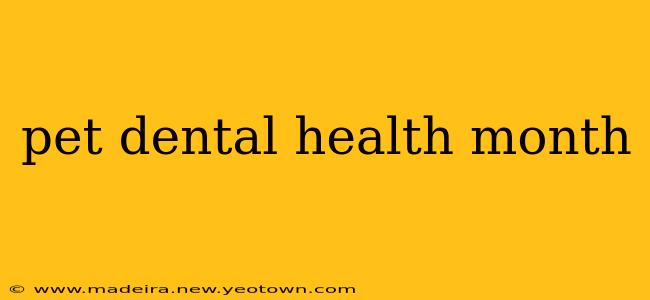February is Pet Dental Health Month, a time dedicated to raising awareness about the importance of maintaining your pet's oral hygiene. Just like us, our furry companions are susceptible to dental disease, which can significantly impact their overall health and well-being. This isn't just about pearly whites; it's about preventing pain, extending their lifespan, and ensuring they enjoy a happy, healthy life. Let's dive into the world of pet dental care and discover how you can keep your beloved pet smiling brightly.
Why is Pet Dental Health So Important?
Imagine waking up every day with a throbbing toothache. That's the reality for many pets suffering from untreated dental disease. Periodontal disease, the most common dental problem in pets, begins with plaque buildup. This sticky film harbors bacteria that irritate the gums, leading to gingivitis (inflammation) and eventually periodontitis (infection of the gums and supporting structures). Left untreated, this infection can spread throughout the body, affecting vital organs like the heart, kidneys, and liver.
What are the Signs of Dental Problems in Pets?
Recognizing the early warning signs is crucial. Are you noticing any of these in your pet?
- Bad breath: Persistent bad breath, often described as a "doggy" or "catty" odor, is a major red flag.
- Red or swollen gums: Inflamed gums are a telltale sign of gingivitis.
- Loose teeth: If you notice any teeth becoming loose or falling out, it's time for a vet visit.
- Excessive drooling: Increased salivation can indicate oral discomfort.
- Pawing at the mouth: Your pet might try to scratch or rub their mouth due to pain.
- Changes in eating habits: Difficulty chewing or reduced appetite could signal dental problems.
- Weight loss: Persistent dental pain can lead to decreased food intake and subsequent weight loss.
How Often Should I Brush My Pet's Teeth?
Ideally, you should brush your pet's teeth daily. We know, that's a big commitment. But even brushing a few times a week makes a difference. Start slowly, introducing the toothbrush gradually. Many pets will resist at first; patience and positive reinforcement are key.
What Kind of Toothbrush and Toothpaste Should I Use?
Don't use human toothpaste! Human toothpaste contains ingredients that are toxic to pets. Use a pet-specific toothpaste formulated for their needs. These toothpastes come in various flavors that many pets find appealing, such as poultry or beef. You'll also want a toothbrush designed for pets; smaller heads are easier to maneuver in their mouths. Finger brushes are a great option for pets who are new to brushing.
What Other Ways Can I Maintain My Pet's Dental Health?
Brushing is essential, but other methods can contribute to excellent oral health:
- Dental chews: Many dental chews are designed to help scrape plaque and tartar from teeth. Choose chews approved by the Veterinary Oral Health Council (VOHC).
- Dental diets: Special veterinary diets are formulated to help reduce plaque and tartar buildup.
- Dental cleaning at the vet: Professional cleanings under anesthesia are vital for removing tartar and plaque that can't be reached with at-home care. This is usually recommended once a year, or more frequently depending on your pet's dental health.
How Often Should My Pet Have a Professional Dental Cleaning?
This depends greatly on your pet and their individual oral hygiene needs. Some pets might only need a professional cleaning once a year, while others require more frequent visits. Your veterinarian will assess your pet's dental health during regular checkups and recommend a cleaning schedule based on their individual needs.
What is the Cost of Professional Dental Cleaning for Pets?
The cost of professional dental cleaning for pets can vary depending on several factors, including your pet's size, the extent of dental disease, and the location of your veterinary clinic. It's best to contact your veterinarian directly to get an accurate estimate for your pet's specific needs.
My Pet is Showing Signs of Dental Disease, What Should I Do?
Don't delay! Schedule an appointment with your veterinarian immediately. Early intervention can prevent more serious complications and improve your pet's quality of life.
Remember, taking care of your pet's dental health isn't just about their smile; it's about their overall health and well-being. By incorporating these tips into your pet's routine, you can help them enjoy a long, happy, and healthy life, one bright smile at a time. This February, let's make Pet Dental Health Month a celebration of healthy smiles!

